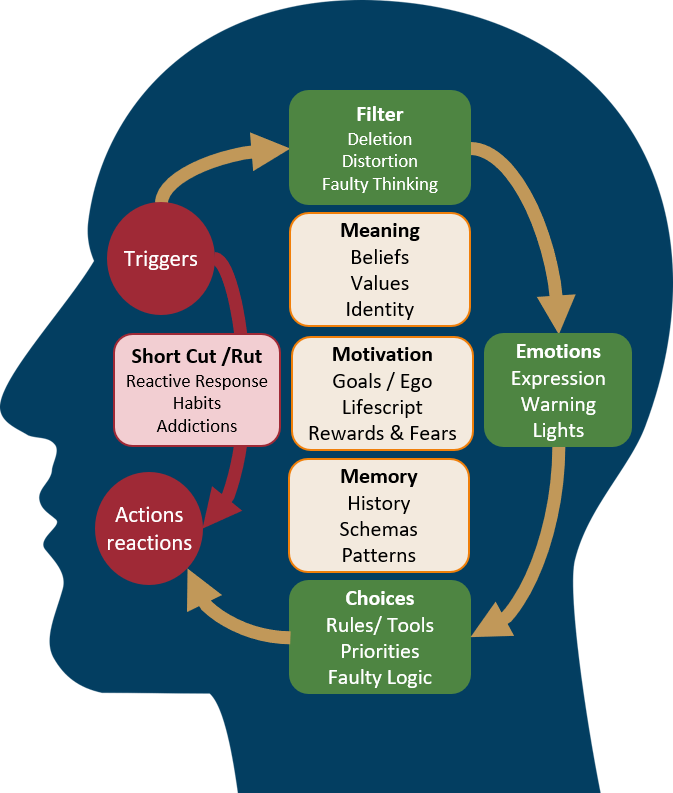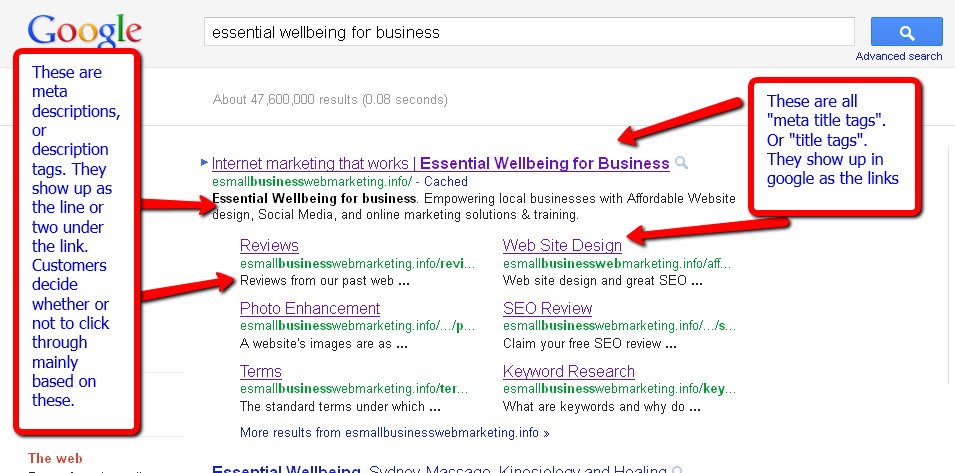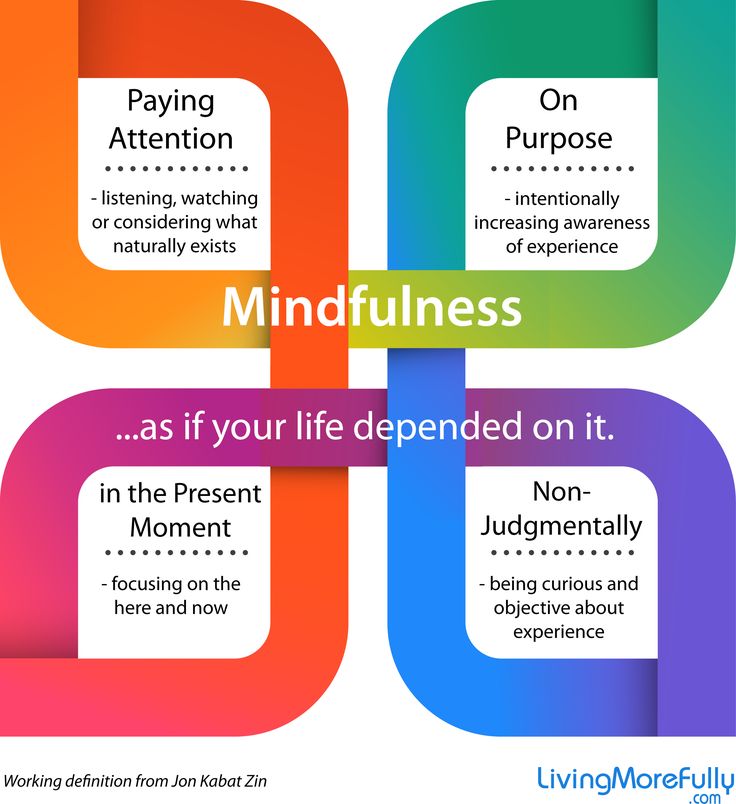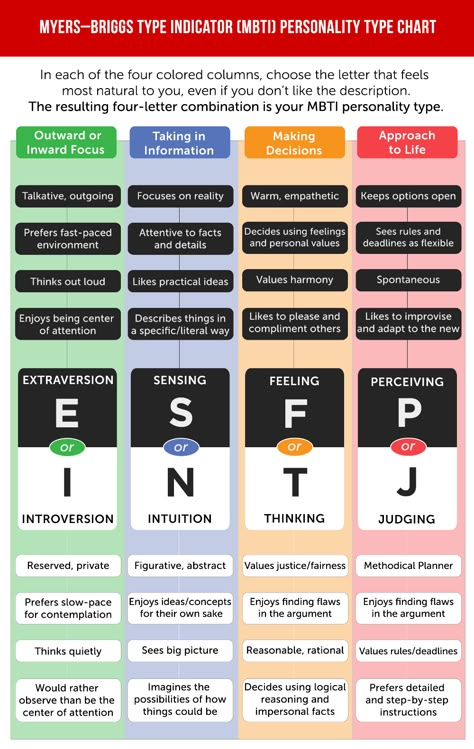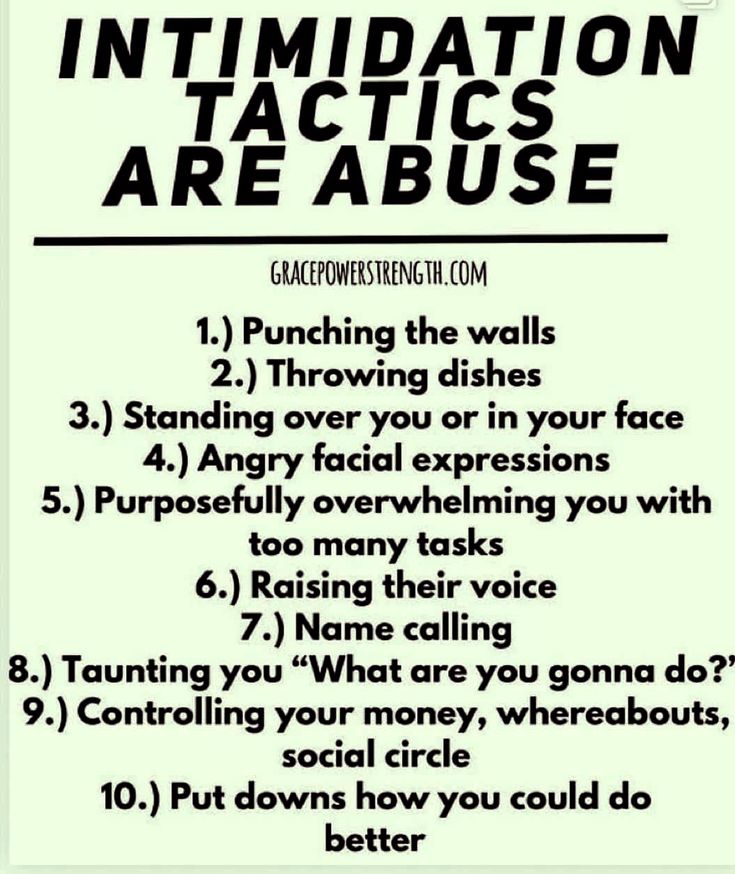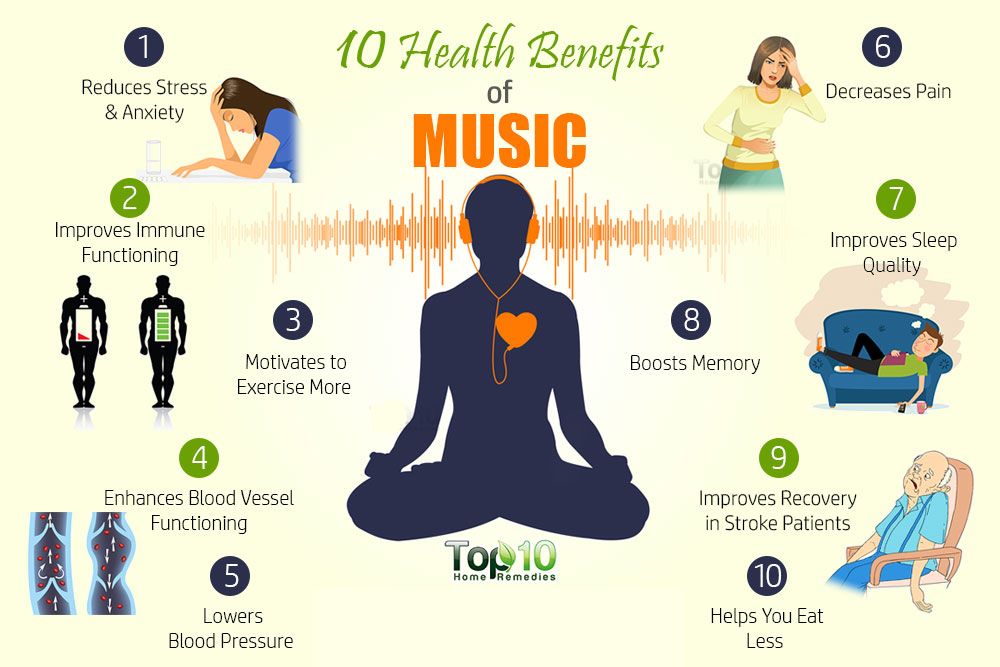Emotional intelligence refers to
What is emotional intelligence and how does it apply to the workplace?
Emotional Intelligence (EI) is the ability to manage both your own emotions and understand the emotions of people around you. There are five key elements to EI: self-awareness, self-regulation, motivation, empathy, and social skills. People with high EI can identify how they are feeling, what those feelings mean, and how those emotions impact their behavior and in turn, other people. It’s a little harder to “manage” the emotions of other people - you can’t control how someone else feels or behaves. But if you can identify the emotions behind their behavior, you’ll have a better understanding of where they are coming from and how to best interact with them.
High EI overlaps with strong interpersonal skills, especially in the areas of conflict management and communication - crucial skills in the workplace. Employees who can self-regulate their emotions are often able to avoid making impulsive decisions - they think objectively before they act.
Operating with empathy and understanding is a critical part of teamwork; being able to attribute someone’s behavior to an underlying emotion will help you manage relationships and make others feel heard. On an individual level, being aware of your feelings is the first step in not letting those feelings control you. Recognizing how you feel and why will help you to sit with those feelings and then move forward in a productive way.
Effective leaders are often very emotionally intelligent. In the workplace, it’s important for leaders to be self-aware and able to view things objectively. This translates into understanding your strengths and weaknesses and acting with humility. This has to be balanced with empathy - employees who feel appreciated and valued at work aren’t only happier, but more productive.
Fortunately, you can improve your EI skills with some thoughtfulness and practice:
- Try to slow down your reactions to emotions - next time you feel angry, try to sit with it before lashing out.
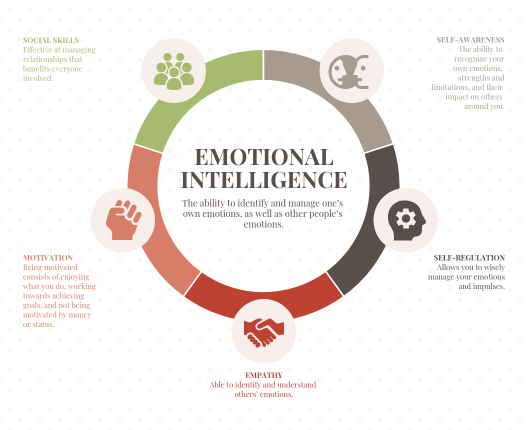 Why are you angry? Did someone upset you? What do you think was the emotion underneath their behavior?
Why are you angry? Did someone upset you? What do you think was the emotion underneath their behavior? - Think about your strengths and weaknesses. No one is good at everything, and that’s okay! Know yourself and when to ask for - or offer - help.
- Put in the effort to understand what people are communicating non-verbally. If you ask someone to help you on a project and they agree, but sound hesitant, recognize that they may feel overwhelmed or confused or they come from a different background and understanding than your own. It’s important to validate and address that before moving forward.
- Work on communicating effectively and openly. Make sure your main point is clear, cut out information that isn’t relevant to the person you’re talking with, and give your full attention when someone else is speaking.
More Information:
What are some mentally healthy management practices?
Types of Toxic Work Environments and How to Address Them
How can we create a diverse and inclusive work environment?
References:
Emotional Intelligence in Leadership
What Is Emotional Intelligence?
Emotional Intelligence: Developing Strong "People Skills"
Emotional Intelligence: EQ or EI
Back to Employer Resources
Improving Emotional Intelligence (EQ) - HelpGuide.
 org
orgemotional intelligence
When it comes to happiness and success in life, EQ matters just as much as IQ. Learn how you can boost your emotional intelligence, build stronger relationships, and achieve your goals.
What is emotional intelligence or EQ?
Emotional intelligence (otherwise known as emotional quotient or EQ) is the ability to understand, use, and manage your own emotions in positive ways to relieve stress, communicate effectively, empathize with others, overcome challenges and defuse conflict. Emotional intelligence helps you build stronger relationships, succeed at school and work, and achieve your career and personal goals. It can also help you to connect with your feelings, turn intention into action, and make informed decisions about what matters most to you.
Emotional intelligence is commonly defined by four attributes:
- Self-management – You're able to control impulsive feelings and behaviors, manage your emotions in healthy ways, take initiative, follow through on commitments, and adapt to changing circumstances.
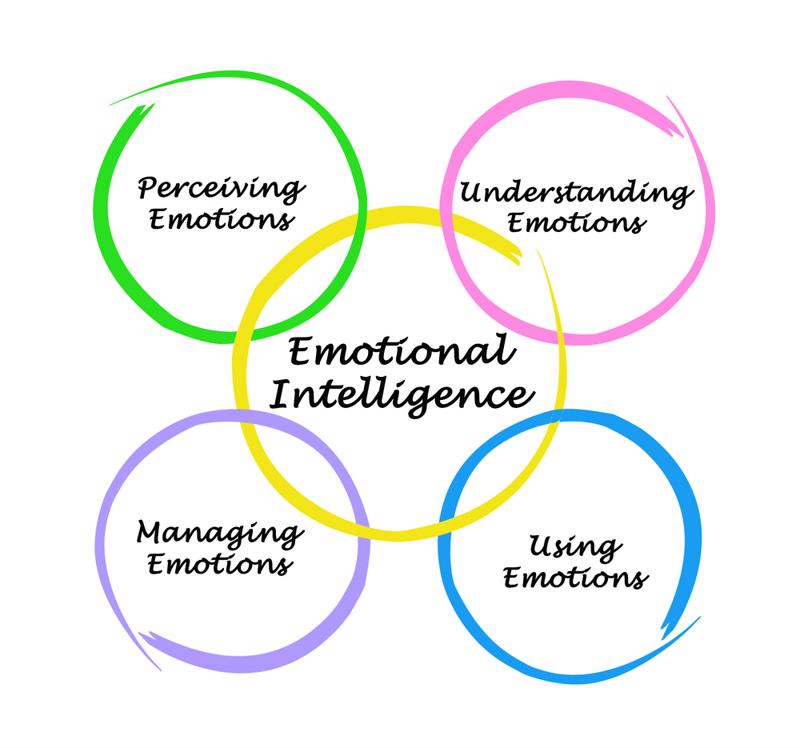
- Self-awareness – You recognize your own emotions and how they affect your thoughts and behavior. You know your strengths and weaknesses, and have self-confidence.
- Social awareness – You have empathy. You can understand the emotions, needs, and concerns of other people, pick up on emotional cues, feel comfortable socially, and recognize the power dynamics in a group or organization.
- Relationship management – You know how to develop and maintain good relationships, communicate clearly, inspire and influence others, work well in a team, and manage conflict.
With over 25,000 licensed counselors, BetterHelp has a therapist that fits your needs. Sign up today and get matched.
GET 20% OFF
Why is emotional intelligence so important?
As we know, it's not the smartest people who are the most successful or the most fulfilled in life. You probably know people who are academically brilliant and yet are socially inept and unsuccessful at work or in their personal relationships.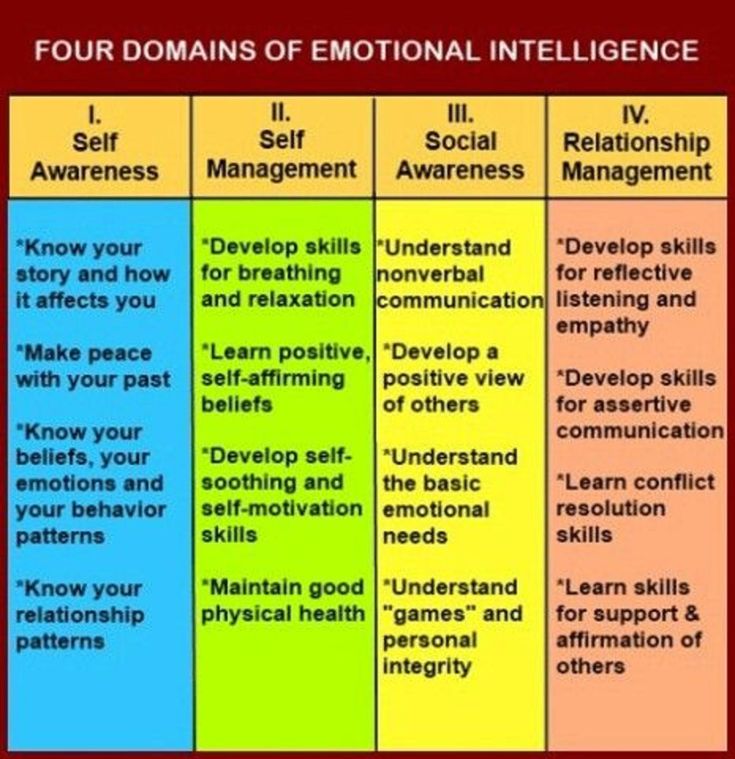 Intellectual ability or your intelligence quotient (IQ) isn't enough on its own to achieve success in life. Yes, your IQ can help you get into college, but it's your EQ that will help you manage the stress and emotions when facing your final exams. IQ and EQ exist in tandem and are most effective when they build off one another.
Intellectual ability or your intelligence quotient (IQ) isn't enough on its own to achieve success in life. Yes, your IQ can help you get into college, but it's your EQ that will help you manage the stress and emotions when facing your final exams. IQ and EQ exist in tandem and are most effective when they build off one another.
Emotional intelligence affects:
Your performance at school or work. High emotional intelligence can help you navigate the social complexities of the workplace, lead and motivate others, and excel in your career. In fact, when it comes to gauging important job candidates, many companies now rate emotional intelligence as important as technical ability and employ EQ testing before hiring.
Your physical health. If you're unable to manage your emotions, you are probably not managing your stress either. This can lead to serious health problems. Uncontrolled stress raises blood pressure, suppresses the immune system, increases the risk of heart attacks and strokes, contributes to infertility, and speeds up the aging process. The first step to improving emotional intelligence is to learn how to manage stress.
The first step to improving emotional intelligence is to learn how to manage stress.
Your mental health. Uncontrolled emotions and stress can also impact your mental health, making you vulnerable to anxiety and depression. If you are unable to understand, get comfortable with, or manage your emotions, you'll also struggle to form strong relationships. This in turn can leave you feeling lonely and isolated and further exacerbate any mental health problems.
[Read: Building Better Mental Health]
Your relationships. By understanding your emotions and how to control them, you're better able to express how you feel and understand how others are feeling. This allows you to communicate more effectively and forge stronger relationships, both at work and in your personal life.
Your social intelligence. Being in tune with your emotions serves a social purpose, connecting you to other people and the world around you. Social intelligence enables you to recognize friend from foe, measure another person's interest in you, reduce stress, balance your nervous system through social communication, and feel loved and happy.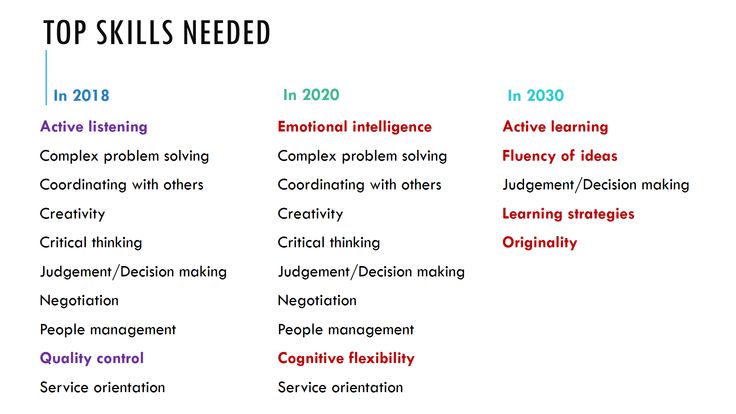
Building emotional intelligence: Four key skills to increasing your EQ
The skills that make up emotional intelligence can be learned at any time. However, it's important to remember that there is a difference between simply learning about EQ and applying that knowledge to your life. Just because you know you should do something doesn't mean you will—especially when you become overwhelmed by stress, which can override your best intentions. In order to permanently change behavior in ways that stand up under pressure, you need to learn how to overcome stress in the moment, and in your relationships, in order to remain emotionally aware.
The key skills for building your EQ and improving your ability to manage emotions and connect with others are:
- Self-management
- Self-awareness
- Social awareness
- Relationship management
Building emotional intelligence, key skill 1: Self-management
In order for you to engage your EQ, you must be able to use your emotions to make constructive decisions about your behavior.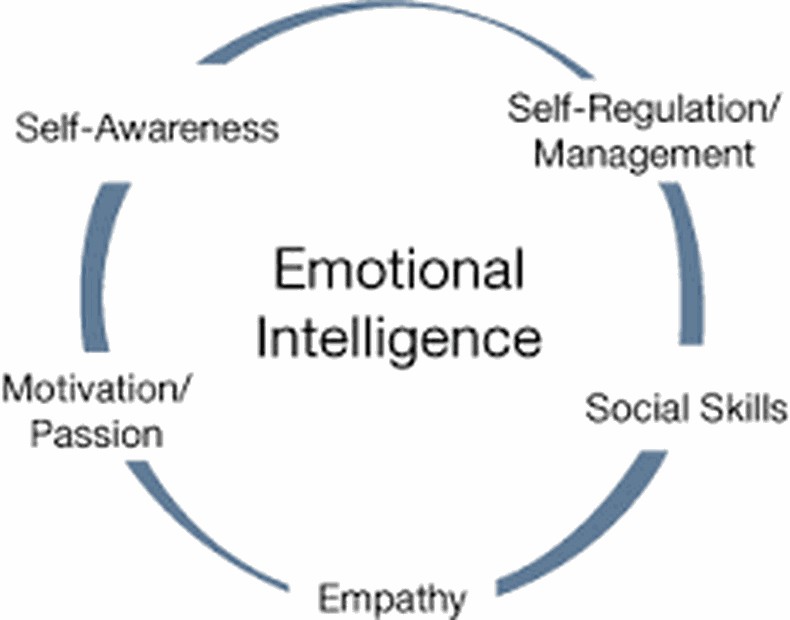 When you become overly stressed, you can lose control of your emotions and the ability to act thoughtfully and appropriately.
When you become overly stressed, you can lose control of your emotions and the ability to act thoughtfully and appropriately.
Think about a time when stress has overwhelmed you. Was it easy to think clearly or make a rational decision? Probably not. When you become overly stressed, your ability to both think clearly and accurately assess emotions—your own and other people's—becomes compromised.
[Read: Stress Management]
Emotions are important pieces of information that tell you about yourself and others, but in the face of stress that takes us out of our comfort zone, we can become overwhelmed and lose control of ourselves. With the ability to manage stress and stay emotionally present, you can learn to receive upsetting information without letting it override your thoughts and self-control. You'll be able to make choices that allow you to control impulsive feelings and behaviors, manage your emotions in healthy ways, take initiative, follow through on commitments, and adapt to changing circumstances.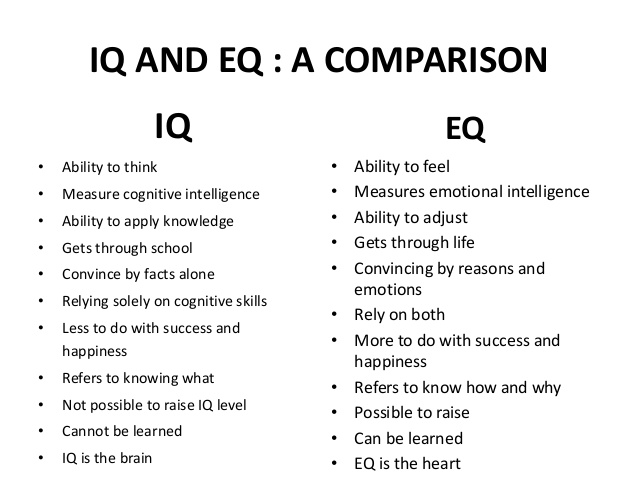
ADVERTISEMENT
Key skill 2: Self-awareness
Managing stress is just the first step to building emotional intelligence. The science of attachment indicates that your current emotional experience is likely a reflection of your early life experience. Your ability to manage core feelings such as anger, sadness, fear, and joy often depends on the quality and consistency of your early life emotional experiences. If your primary caretaker as an infant understood and valued your emotions, it's likely your emotions have become valuable assets in adult life. But, if your emotional experiences as an infant were confusing, threatening or painful, it's likely you've tried to distance yourself from your emotions.
But being able to connect to your emotions—having a moment-to-moment connection with your changing emotional experience—is the key to understanding how emotion influences your thoughts and actions.
Do you experience feelings that flow, encountering one emotion after another as your experiences change from moment to moment?
Are your emotions accompanied by physical sensations that you experience in places like your stomach, throat, or chest?
Do you experience individual feelings and emotions, such as anger, sadness, fear, and joy, each of which is evident in subtle facial expressions?
Can you experience intense feelings that are strong enough to capture both your attention and that of others?
Do you pay attention to your emotions? Do they factor into your decision making?
If any of these experiences are unfamiliar, you may have “turned down” or “turned off” your emotions.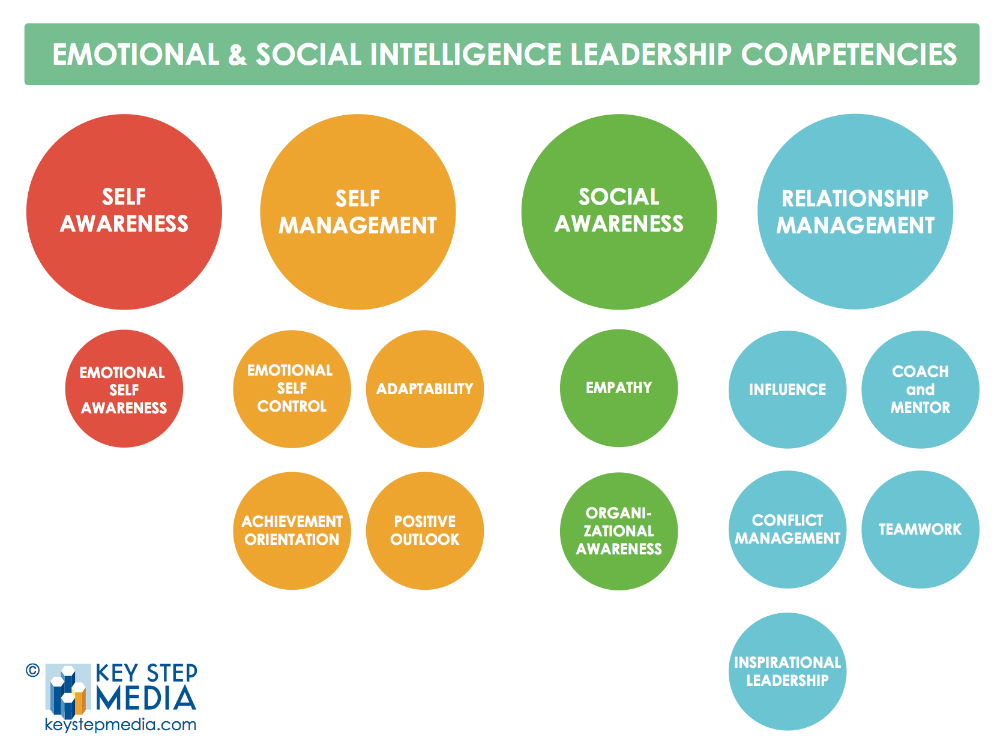 In order to build EQ—and become emotionally healthy—you must reconnect to your core emotions, accept them, and become comfortable with them. You can achieve this through the practice of mindfulness.
In order to build EQ—and become emotionally healthy—you must reconnect to your core emotions, accept them, and become comfortable with them. You can achieve this through the practice of mindfulness.
[Listen: Mindful Breathing Meditation]
Mindfulness is the practice of purposely focusing your attention on the present moment—and without judgment. The cultivation of mindfulness has roots in Buddhism, but most religions include some type of similar prayer or meditation technique. Mindfulness helps shift your preoccupation with thought toward an appreciation of the moment, your physical and emotional sensations, and brings a larger perspective on life. Mindfulness calms and focuses you, making you more self-aware in the process.
Developing emotional awareness
It's important that you learn how to manage stress first, so you'll feel more comfortable reconnecting to strong or unpleasant emotions and changing how you experience and respond to your feelings. You can develop your emotional awareness by using HelpGuide's free Emotional Intelligence Toolkit.
You can develop your emotional awareness by using HelpGuide's free Emotional Intelligence Toolkit.
Social awareness enables you to recognize and interpret the mainly nonverbal cues others are constantly using to communicate with you. These cues let you know how others are really feeling, how their emotional state is changing from moment to moment, and what's truly important to them.
[Read: Effective Communication]
When groups of people send out similar nonverbal cues, you're able to read and understand the power dynamics and shared emotional experiences of the group. In short, you're empathetic and socially comfortable.
Mindfulness is an ally of emotional and social awareness
To build social awareness, you need to recognize the importance of mindfulness in the social process. After all, you can't pick up on subtle nonverbal cues when you're in your own head, thinking about other things, or simply zoning out on your phone. Social awareness requires your presence in the moment.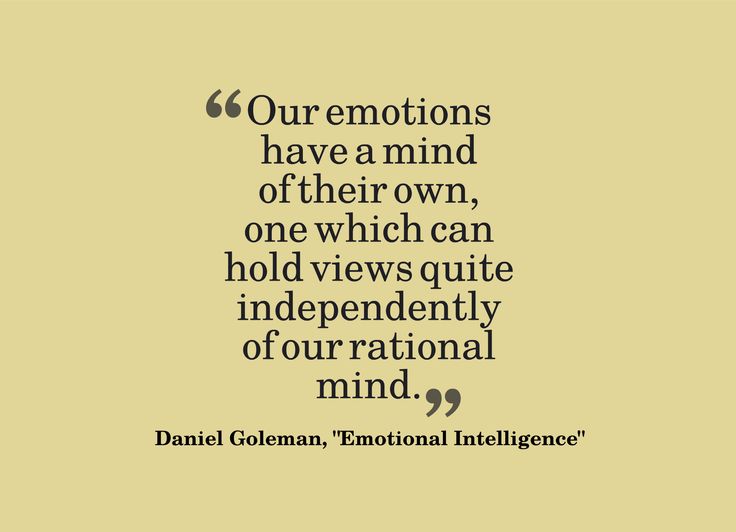 While many of us pride ourselves on an ability to multitask, this means that you'll miss the subtle emotional shifts taking place in other people that help you fully understand them.
While many of us pride ourselves on an ability to multitask, this means that you'll miss the subtle emotional shifts taking place in other people that help you fully understand them.
- You are actually more likely to further your social goals by setting other thoughts aside and focusing on the interaction itself.
- Following the flow of another person's emotional responses is a give-and-take process that requires you to also pay attention to the changes in your own emotional experience.
- Paying attention to others doesn't diminish your own self-awareness. By investing the time and effort to really pay attention to others, you'll actually gain insight into your own emotional state as well as your values and beliefs. For example, if you feel discomfort hearing others express certain views, you'll have learned something important about yourself.
Advertisement
Discover the Power of Awareness
Want to overcome negative self-talk and other limiting beliefs? Join Tara Brach and Jack Kornfield for a free video from Sounds True on the Power of Awareness, online mindfulness training to transform your life.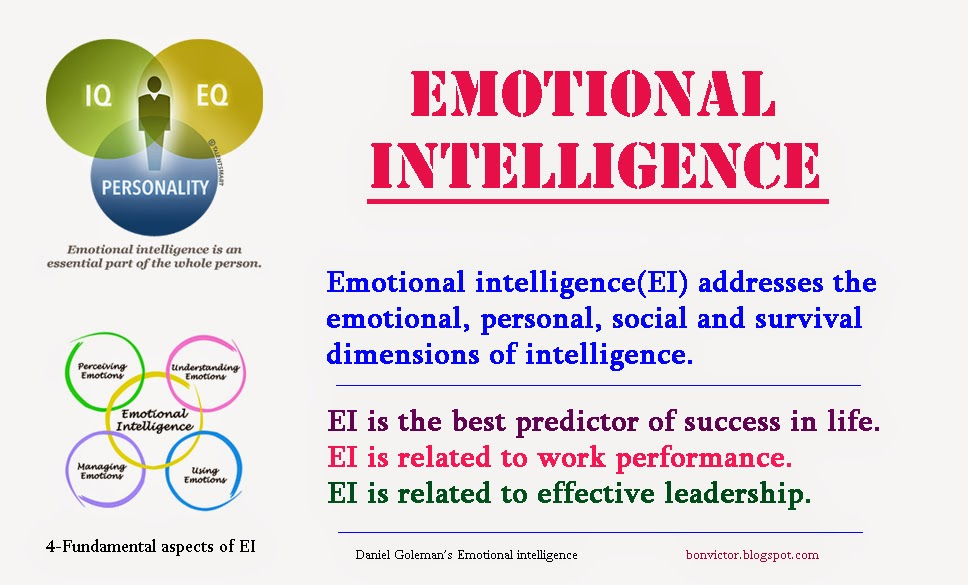
SIGN UP FOR THE FREE VIDEO
Key skill 4: Relationship management
Working well with others is a process that begins with emotional awareness and your ability to recognize and understand what other people are experiencing. Once emotional awareness is in play, you can effectively develop additional social/emotional skills that will make your relationships more effective, fruitful, and fulfilling.
Become aware of how effectively you use nonverbal communication. It's impossible to avoid sending nonverbal messages to others about what you think and feel. The many muscles in the face, especially those around the eyes, nose, mouth and forehead, help you to wordlessly convey your own emotions as well as read other peoples' emotional intent. The emotional part of your brain is always on—and even if you ignore its messages—others won't. Recognizing the nonverbal messages that you send to others can play a huge part in improving your relationships.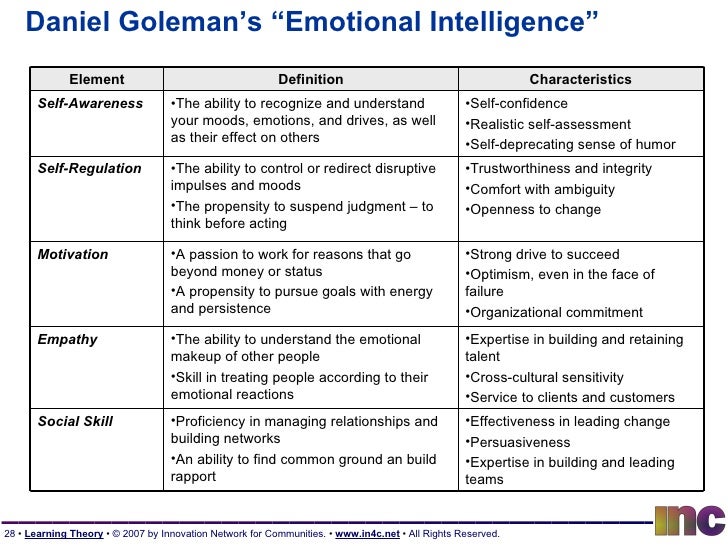
Use humor and play to relieve stress. Humor, laughter and play are natural antidotes to stress. They lessen your burdens and help you keep things in perspective. Laughter brings your nervous system into balance, reducing stress, calming you down, sharpening your mind and making you more empathic.
Learn to see conflict as an opportunity to grow closer to others. Conflict and disagreements are inevitable in human relationships. Two people can't possibly have the same needs, opinions, and expectations at all times. However, that needn't be a bad thing. Resolving conflict in healthy, constructive ways can strengthen trust between people. When conflict isn't perceived as threatening or punishing, it fosters freedom, creativity, and safety in relationships.
Authors: Jeanne Segal, Ph.D., Melinda Smith, M.A., Lawrence Robinson, and Jennifer Shubin
- References
Gilar-Corbi, R.
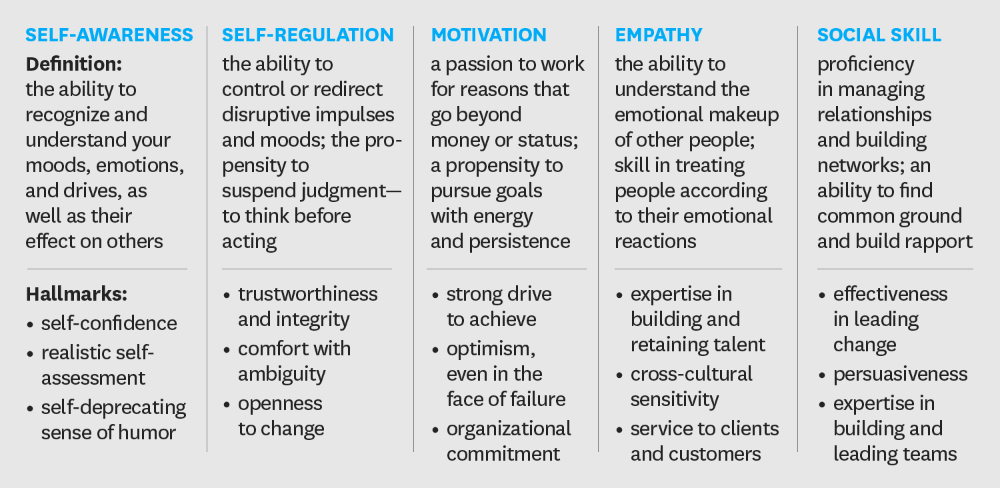 , Pozo-Rico, T., Sánchez, B., & Castejón, J.-L. (2019). Can emotional intelligence be improved? A randomized experimental study of a business-oriented EI training program for senior managers. PLOS ONE, 14(10), e0224254. https://doi.org/10.1371/journal.pone.0224254
, Pozo-Rico, T., Sánchez, B., & Castejón, J.-L. (2019). Can emotional intelligence be improved? A randomized experimental study of a business-oriented EI training program for senior managers. PLOS ONE, 14(10), e0224254. https://doi.org/10.1371/journal.pone.0224254How to Improve Your Emotional Intelligence—Professional Development | Harvard DCE. (n.d.). Retrieved June 18, 2022, from https://professional.dce.harvard.edu/blog/how-to-improve-your-emotional-intelligence/
Jiménez-Picón, N., Romero-Martín, M., Ponce-Blandón, J. A., Ramirez-Baena, L., Palomo-Lara, J. C., & Gómez-Salgado, J. (2021). The Relationship between Mindfulness and Emotional Intelligence as a Protective Factor for Healthcare Professionals: Systematic Review. International Journal of Environmental Research and Public Health, 18(10), 5491. https://doi.org/10.3390/ijerph28105491
Segal, Jeanne. The Language of Emotional Intelligence: The Five Essential Tools for Building Powerful and Effective Relationships.
 1st edition. McGraw Hill, 2008. https://www.amazon.com/Language-Emotional-Intelligence-Essential-Relationships/dp/0071544550
1st edition. McGraw Hill, 2008. https://www.amazon.com/Language-Emotional-Intelligence-Essential-Relationships/dp/0071544550Segal, Jeanne S. Raising Your Emotional Intelligence: A Practical Guide–A Hands-on Program for Harnessing the Power of Your Instincts and Emotions. 1st edition. Holt Paperbacks, 2015. https://www.amazon.com/Raising-Your-Emotional-Intelligence-Practical/dp/0805051511/ref=tmm_pap_swatch_0?_encoding=UTF8&qid=&sr=
Last updated: November 30, 2022
What is emotional intelligence: how to develop it
In general terms, as we have already said, EQ is one of the success factors. But let's break down why emotional intelligence is important.
1. Better self-awareness.
To understand the source and nature of one's feelings is a desire that is familiar to everyone. Unfortunately, we often confuse anxiety with panic or anger, and the feeling of fleeting involvement with great love.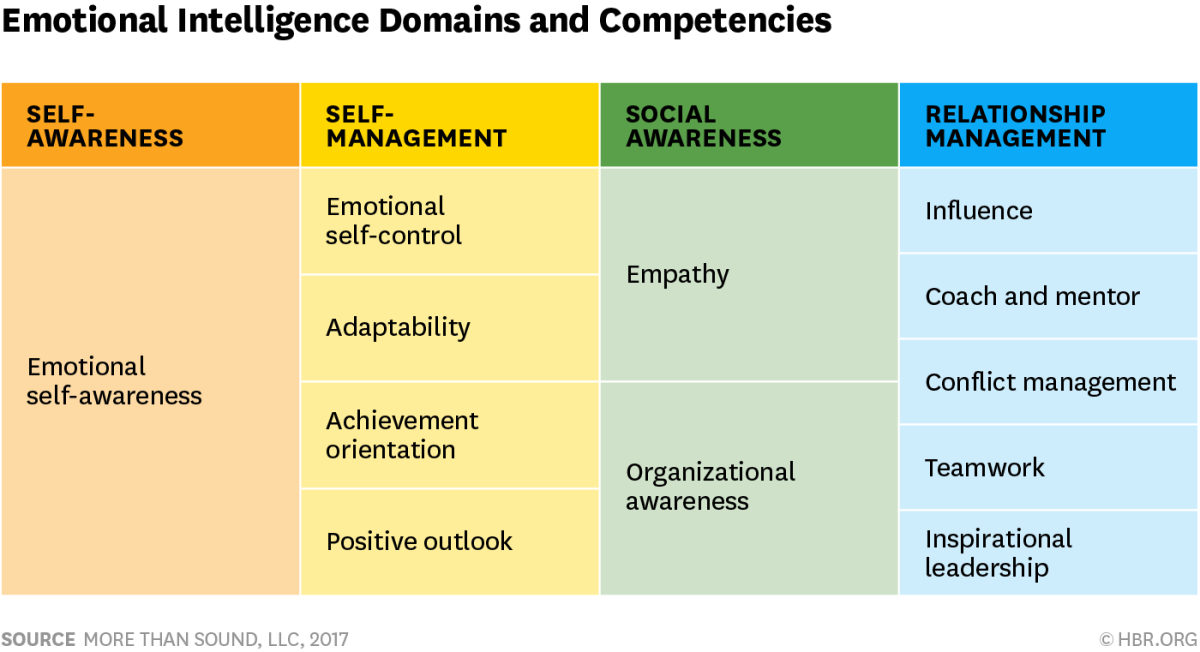 Developing emotional intelligence will help you better understand the emotional situation both within you and around you. For example, to end a senseless argument on time, to refuse an inappropriate load, and the like. That is, EI in this case helps to rationally recognize emotions and respond to them correctly.
Developing emotional intelligence will help you better understand the emotional situation both within you and around you. For example, to end a senseless argument on time, to refuse an inappropriate load, and the like. That is, EI in this case helps to rationally recognize emotions and respond to them correctly.
2. Improved self-regulation.
We often lack either the will power or the time and motivation to form a certain lifestyle. For example, the introduction of a system of conscious eating or time management in personal and work life. A high level of emotional intelligence just allows you to cope with this, because with the awareness of your feelings, the ability to control yourself appears. This includes understanding your behavior and mistakes, and the ability not to repeat them next time. This moment is especially important for the formation of one's own reputation: high EQ, improving self-control, helps to be a more responsible person, to keep promises and agreements.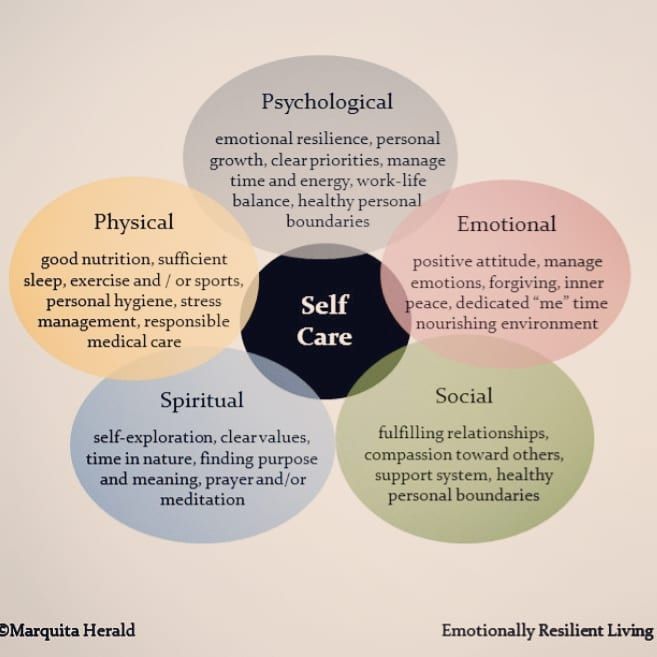
3. Stable and strong motivation.
The level of emotional intelligence directly affects a person's motivation and proactivity. High EQ allows you to learn better, faster and more productively, procrastinate to a minimum, endure difficulties with a positive attitude and soberly analyze personal mistakes. Also, a person with a developed emotional intelligence seeks to meet expectations, is more open in discussing work issues, clearly explains what and from whom he expects. Another important point: the ability to soberly assess your strengths and correctly plan the distribution of resources. Free time for such a person is always busy with useful things, training or planning.
4. Improved empathy.
Remember, when defining emotional intelligence itself, we pointed out that, by and large, it is the ability to understand other people's emotions and work with them? This is empathy, which is important in all areas of life. This is an opportunity to fully tune into other people, realize their problems and needs, read non-verbal signs and switch attention in the right way.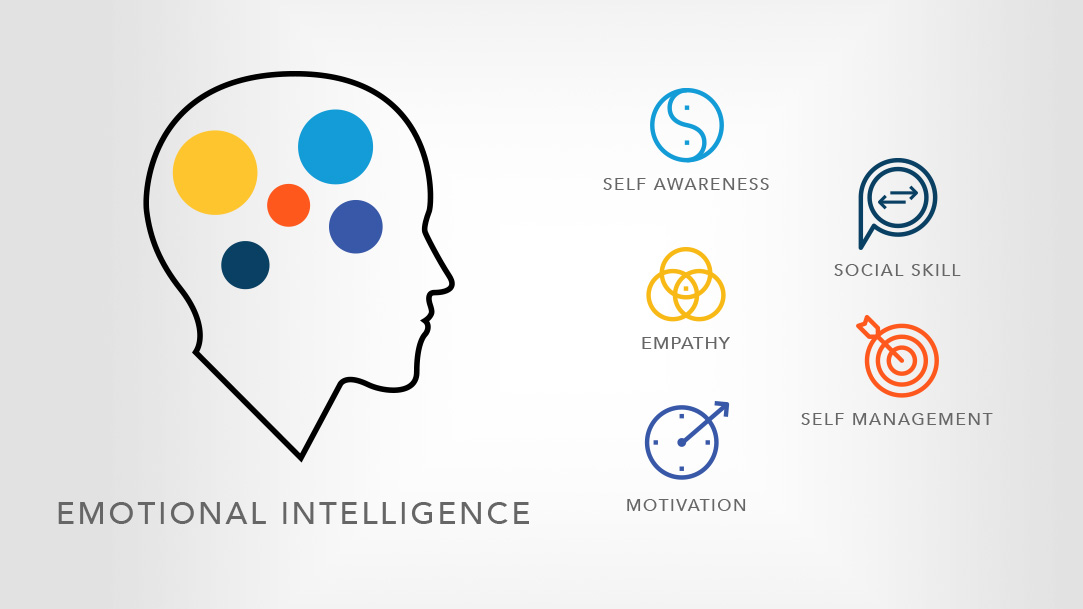 A person with developed EI knows how to do this, and also feels justice better, respects other people's interests and weaknesses, does not push confronting individuals and always orients himself in who is "in charge".
A person with developed EI knows how to do this, and also feels justice better, respects other people's interests and weaknesses, does not push confronting individuals and always orients himself in who is "in charge".
5. More adequate and healthy social relationships.
All of the above leads to the main goal: to better understand people and interact with them. This consists of a sober assessment of the strengths and capabilities of others, the ability to refrain from influence from the masses, not to be held hostage to personal emotions and their manifestations from the wrong side. People with high EQ are good at rhetoric and the art of persuasion, clearly describe tasks and set priorities in the team, and do not succumb to bouts of passive-aggressive behavior. They can calmly and painlessly organize various changes in the family and work, properly prepare people for various situations. A team filled with such people is always more efficient, its emotional environment is healthier.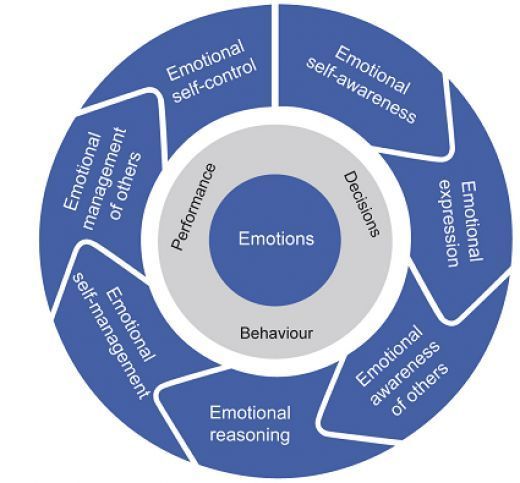 Here, it is easier for specialists to learn new skills, interact with each other and keep healthy competition.
Here, it is easier for specialists to learn new skills, interact with each other and keep healthy competition.
Thus, emotional intelligence is needed to be more aware, better understand your emotions and yourself. It is also a powerful tool for creating harmonious relationships with others. These two factors greatly increase your chances of success in your work and personal life.
A completely logical question arises: how to test your emotional intelligence? First of all, you need to adequately look at your life, your behavior and the state of relations with others. In 80% of people, this does not work out and other methods are used. For example, the MSCEIT technique is a method for determining EQ (EI coefficient), during the implementation of which the subject is shown various photos with portraits. Various emotions are imprinted on them, and the subject needs to recognize them. Such a test is best done under the supervision of a specialist who will correctly decipher your results.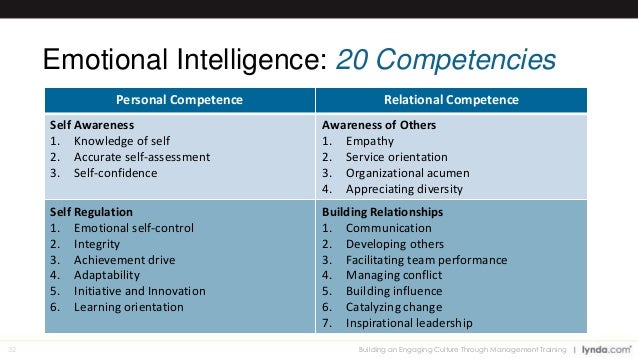 The most popular and reliable is the Hall method, which is based on 30 questions to determine the state of the basic characteristics of EI. This test is freely available on the Internet, as well as dozens of other similar ones.
The most popular and reliable is the Hall method, which is based on 30 questions to determine the state of the basic characteristics of EI. This test is freely available on the Internet, as well as dozens of other similar ones.
What is emotional intelligence and how it defines our lives
What is emotional intelligence
In the mid-1990s, the Western world exploded with the psychological bestseller by journalist Daniel Goleman, Emotional Intelligence: Why It Matters More Than IQ. Through facts about the human brain, the history of emotions and anthropology, Goleman tried to give his version of a successful person, using the research of American scientists. At that moment, they were actively looking for the ingredient of success, analyzing the achievements of different people in childhood and adulthood, their cognitive and social skills. Of course, the origin, heredity and the forces invested in education affect the viability of a person in adulthood, but success in life - especially for people without innate privileges - is affected by a unique combination of intellectual abilities and emotional sensitivity, when a person does not use his own feelings and desires destructively, but to achieve long-term goals.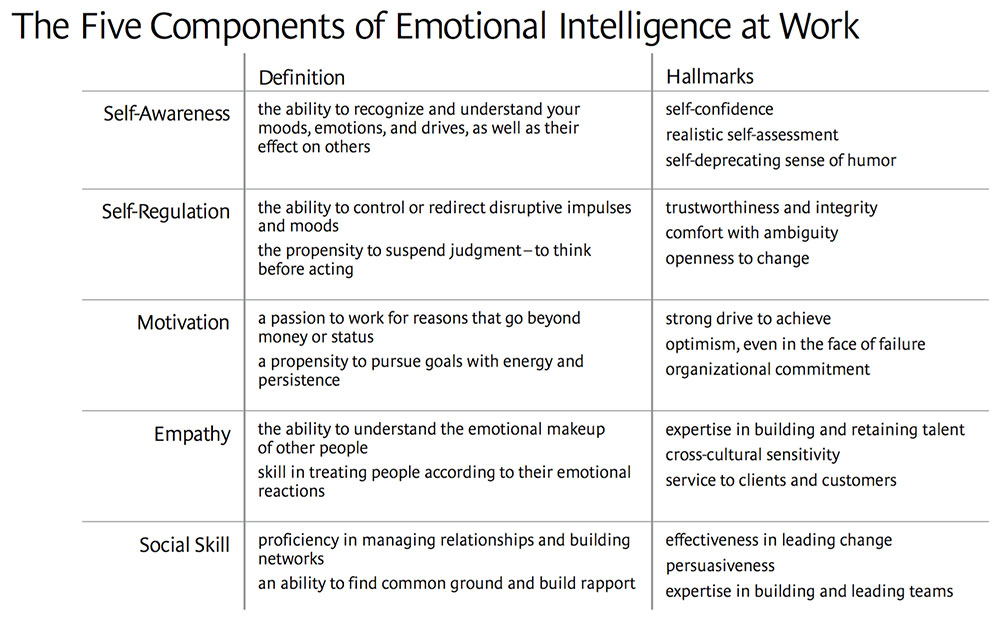 Whatever the university degree, parental family and the first years of a happy life, it is the ability of a person to manage his feelings and notice the feelings of others that will affect his ability to establish long-term relationships in his personal life and business, gain influence, draw attention to himself, lead a team, make friends and start a family.
Whatever the university degree, parental family and the first years of a happy life, it is the ability of a person to manage his feelings and notice the feelings of others that will affect his ability to establish long-term relationships in his personal life and business, gain influence, draw attention to himself, lead a team, make friends and start a family.
Emotional intelligence in a broad sense is the recognition of both positive and negative feelings for oneself and others, the ability to separate personal feelings from bare facts, as well as the ability to feel mood, temperament, intonation and intentions in communication with other people, regardless of whether whether they are old acquaintances or you see them for the first time in your life. An important part of emotional intelligence is the ability to recognize and honestly describe one’s own emotions, the ability not to panic and reject “bad emotions” (anger, jealousy, irritation, envy, anger) and the widespread use of emotionally colored language with self-messages.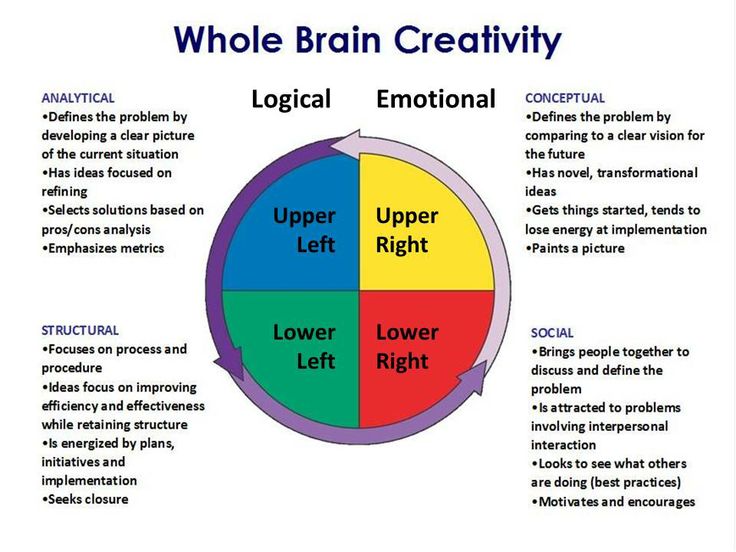 People who are able to articulate their feelings (“I’m sorry that our vacation is so casual” instead of “Why don’t you come up with something again?” Is the first tangible sign), realize their source and calmly discuss further actions without getting personal, there are not Often. And the time spent with them, for the majority, turns out to be very high-quality communication.
People who are able to articulate their feelings (“I’m sorry that our vacation is so casual” instead of “Why don’t you come up with something again?” Is the first tangible sign), realize their source and calmly discuss further actions without getting personal, there are not Often. And the time spent with them, for the majority, turns out to be very high-quality communication.
Psychologists generally divide emotional intelligence into four categories of skills. The first is the ability to communicate clearly and distinctly with others, explain expectations, actively listen, influence and inspire, work in or lead a team, and resolve conflicts. The second is general empathy and a comfortable sense of self in a large group of people: whether you're an extrovert or an introvert, you feel the emotional cues of others and rarely encounter misunderstandings. Third feature - Knowing your strengths and weaknesses and calmly coexisting with them, as well as a good knowledge of personal emotions and their influence on your life.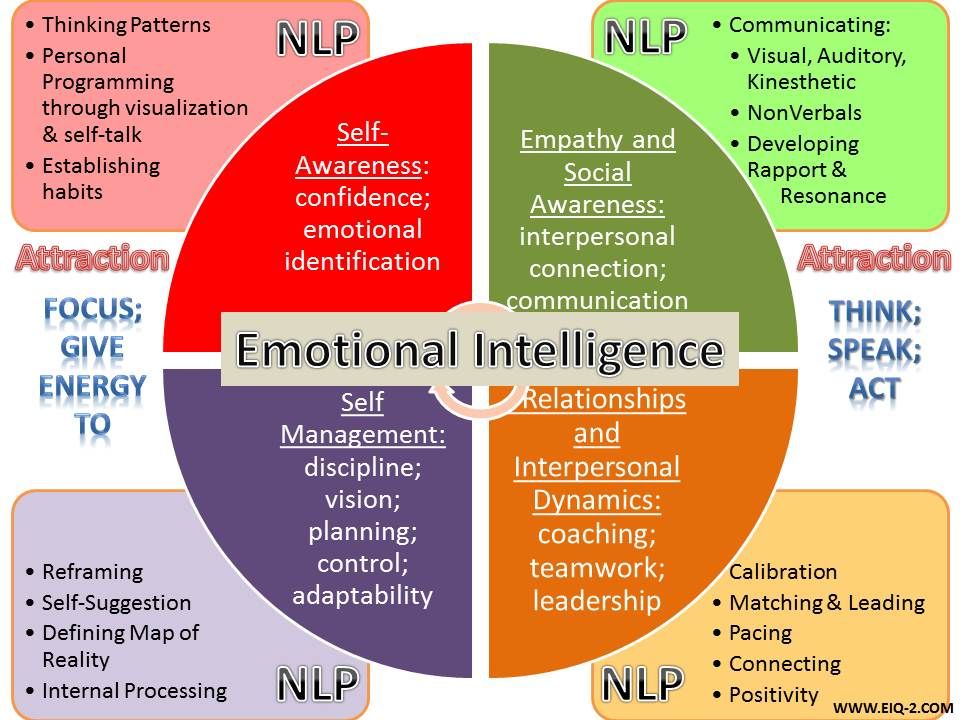 And the last is the ability to manage emotions, limit their destructive influence on oneself, the ability to fulfill obligations, maintain long-term relationships and change in accordance with the environment.
And the last is the ability to manage emotions, limit their destructive influence on oneself, the ability to fulfill obligations, maintain long-term relationships and change in accordance with the environment.
By itself, emotional intelligence is able to keep a person afloat, but it brings the best results in a career in combination with deep knowledge and strong motivation. Indeed, a high IQ helps you get into university or get a long-awaited job, but it is a developed emotional intelligence that affects exposure to stress, helps you start relationships in a new place or adapt to a turbulent work situation. Self-regulation, the ability to hear and put oneself in the place of another, the ability to manage mood complements practical skills and abilities in all areas where communication is required. Obviously, in an age when most unpleasant tasks have already been assigned or will soon be transferred to machines, such areas are the vast majority.
© JakeOlimb; erhui1979 / istockphoto.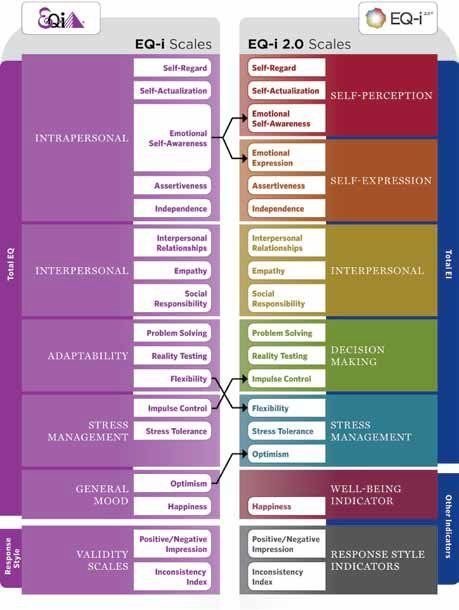 com
com
What Emotional Intelligence Influences and Why You Can't Do Without It
How often have you come across an incredibly talented and at the same time optional person who does not keep agreements? Have you ever been in his place? Were you interrupted with inappropriate remarks, or did your intervention only exacerbate the conflict? Has it ever happened that because of unvoiced expectations, your relationship only got worse and no one could determine what was the reason? All of these situations reflect problems with emotional intelligence: when a misunderstanding of intent and mood, emotional state and motivation makes simple communication tense, negative, or even rude. What is emotional intelligence primarily affected by?
- Self-awareness -
Feeling euphoria or depression, causeless anxiety or a very specific concern, a person with a high EQ understands what is happening to him and what it is called. He is able to distinguish anxiety from anger or panic, and spontaneous tender joy from intense emotional intimacy.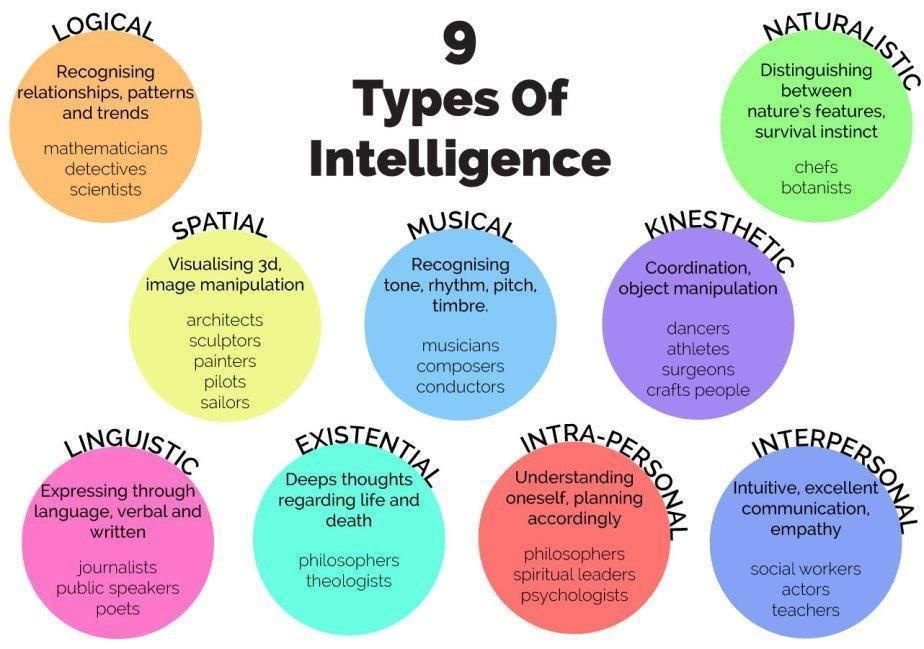 Being aware of his feelings, he is able to move away from them and not delve into destructive and incorporeal thoughts. For example, he will not take a slight infatuation for great love, and a curious prospect for the main goal of life. Based on emotions, he will make long-term plans, where mood swings or new events in life in general will not greatly change the vector of his development. This does not mean at all a dull life, without impressions, in which one cannot be subjected to impulse. Rather, it is a deep knowledge of how to respond to specific emotions. For example, do not continue a fruitless argument when all parties to the conflict are on edge. Do not take on too many responsibilities in a state of euphoria. Do not be afraid to admit to yourself in unsightly feelings and take responsibility for them. Don't do good to others without their request. These "nots" are taken from personal negative experiences and are often automatically adjusted after a few misses - it just takes time to catch the connection between our feelings and subsequent actions.
Being aware of his feelings, he is able to move away from them and not delve into destructive and incorporeal thoughts. For example, he will not take a slight infatuation for great love, and a curious prospect for the main goal of life. Based on emotions, he will make long-term plans, where mood swings or new events in life in general will not greatly change the vector of his development. This does not mean at all a dull life, without impressions, in which one cannot be subjected to impulse. Rather, it is a deep knowledge of how to respond to specific emotions. For example, do not continue a fruitless argument when all parties to the conflict are on edge. Do not take on too many responsibilities in a state of euphoria. Do not be afraid to admit to yourself in unsightly feelings and take responsibility for them. Don't do good to others without their request. These "nots" are taken from personal negative experiences and are often automatically adjusted after a few misses - it just takes time to catch the connection between our feelings and subsequent actions.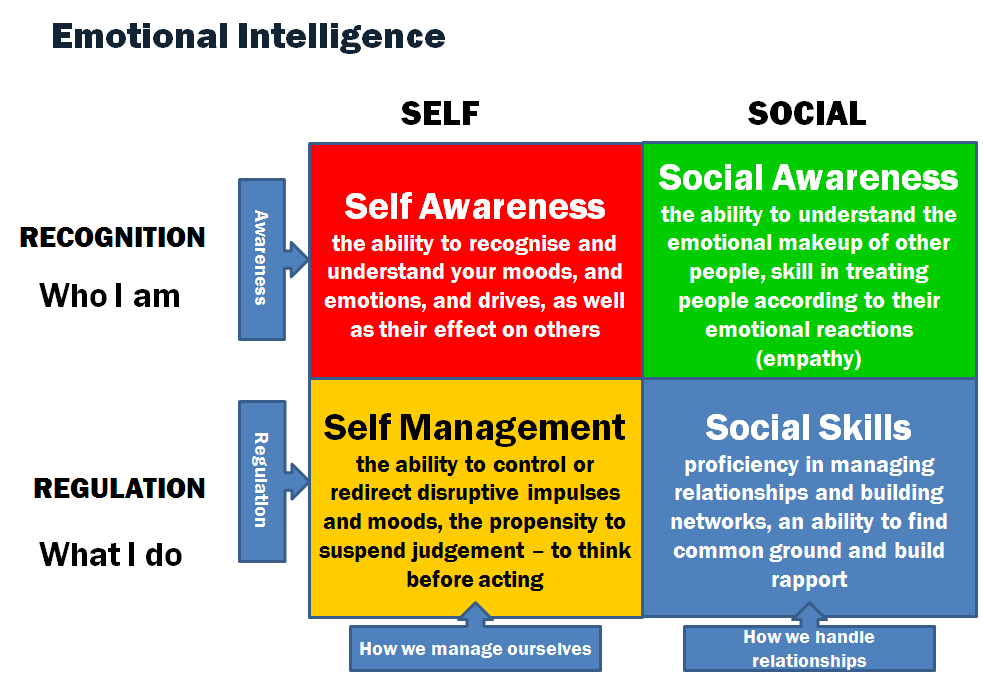
— Self-regulation —
Understanding your feelings, it is easy to manage yourself — from conscious nutrition to work schedule and work time planning. A high EQ means that we take responsibility for our lives and the final result of all relationships - work and personal - and do not look for someone to blame. Instead of putting the blame on colleagues who let us down, or the other half who did not understand us correctly, people with high EQ tend to ask themselves questions at what point in the misunderstanding worsened, what exactly they could have done better - and use this knowledge in the next similar situations. Self-control contributes to the fact that we do not allow negative emotions - anger, anxiety, fatigue - to affect others and monitor our own reputation: we keep our word, promise and agreements on an ongoing basis outside of force majeure. Results are judged by the efforts and actions of one's own, and not through the analysis of the mistakes of others.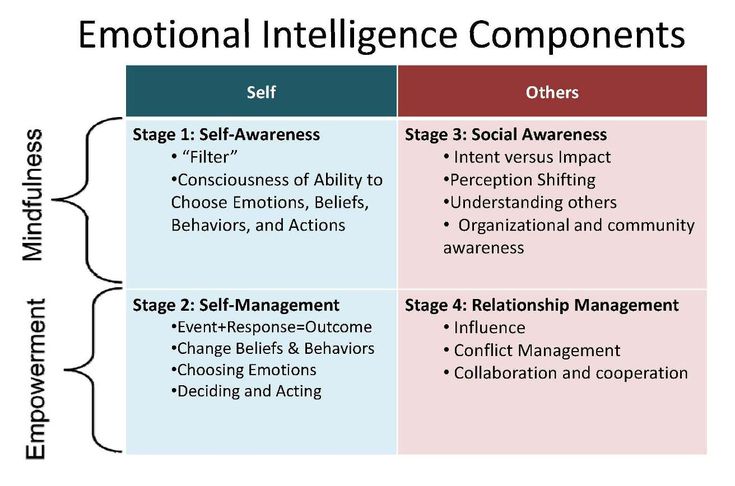 And new conditions and life situations do not plunge into an alarming state: a person with a high EQ will look in difficulties for the possibility of solving them and personal growth or moving to another job and to other relationships. Of course, this does not mean that you need to turn into a robot, in which all impulses and reactions are ordered. Rather, emotional intelligence means a sound assessment of one's capabilities and merits, recognizing people's right to behave as they want, and the ability to resolve conflict situations in a clash of interests without becoming their hostages for many months.
And new conditions and life situations do not plunge into an alarming state: a person with a high EQ will look in difficulties for the possibility of solving them and personal growth or moving to another job and to other relationships. Of course, this does not mean that you need to turn into a robot, in which all impulses and reactions are ordered. Rather, emotional intelligence means a sound assessment of one's capabilities and merits, recognizing people's right to behave as they want, and the ability to resolve conflict situations in a clash of interests without becoming their hostages for many months.
- Motivation -
Emotional intelligence is closely related to motivation and proactive behavior - the ability to adequately respond to change, unite (rather than divide) people, represent other people's interests, delegate power and inspire people to believe in the best. A person with a high EQ is easy to train and relates to temporary difficulties without a decadent attitude, guided by the principle “if we don’t try, we won’t know.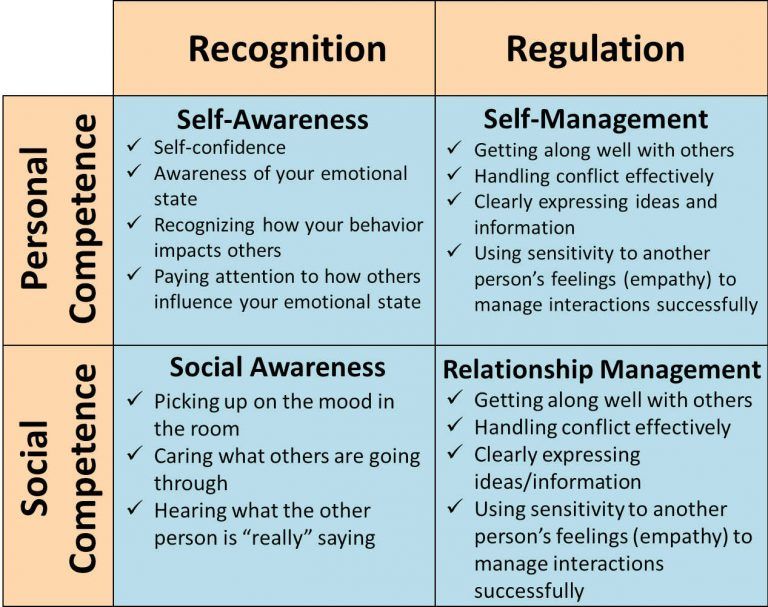 ” He analyzes his own and other people's mistakes well, is not presumptuous, and therefore knows how to influence the mood of the group without intimidating or making light promises.
” He analyzes his own and other people's mistakes well, is not presumptuous, and therefore knows how to influence the mood of the group without intimidating or making light promises.
Firstly, emotional intelligence influences the desire to justify one's own and other people's expectations and to treat these guarantees more responsibly. Secondly, the need to discuss mutual expectations at work or in the family provides an opportunity to express concerns about why the “gray areas” in a large task become smaller over time. Thirdly, emotional intelligence is almost always associated with the rational allocation of resources and initiative: instead of procrastinating, a proactive person will choose to teach or help another, arrange a common space, additional skills or free time. You have probably noticed that in any team there is a person who needs a little more than others, and he willingly shares this - he has ideas on how to spend the evening, he grows flowers in the office or brings treats, helps others without complaint and takes on education of trainees.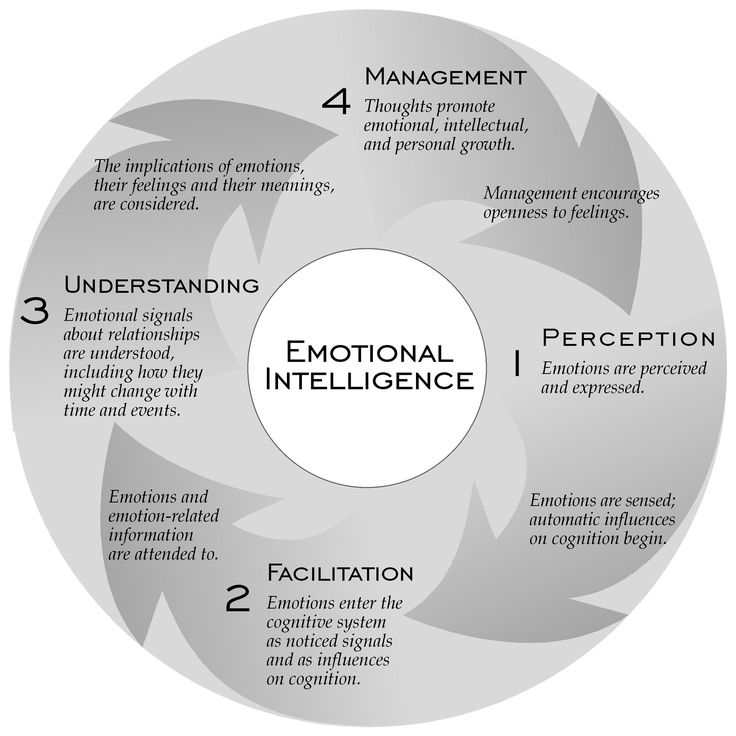 All this is one way or another an example of motivation in the workplace. In personal life, everything works in much the same way. We know people who always call first, choose a new place for a group dinner, book a group trip, invite them on a date, never forget a birthday - all these are also signs of emotional intelligence.
All this is one way or another an example of motivation in the workplace. In personal life, everything works in much the same way. We know people who always call first, choose a new place for a group dinner, book a group trip, invite them on a date, never forget a birthday - all these are also signs of emotional intelligence.
- Empathy -
In a broad sense, emotional intelligence affects the ability to understand what others feel and think. This can include a lot of information of various kinds: both knowledge of social psychology about group behavior or relationships in a couple, as well as specific skills to calm and get a panicked person out of a stupor, knowledge of the correct wording and ways to divert attention. In general, empathy is attunement to others in any of their states, accepting their mood, understanding language and reading non-verbal signs. The first thing that emotional intelligence affects is the ability to recognize the emotions of others and draw conclusions from this.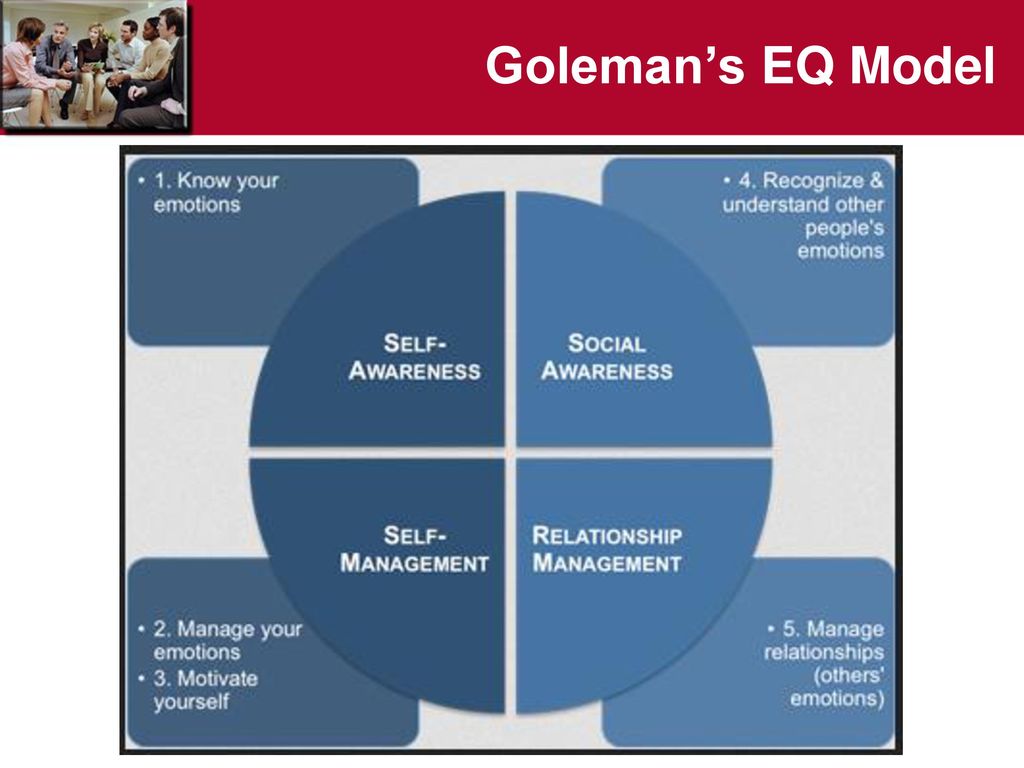 The rule of not yelling at a crying baby or having long arguments with aggressive people is a basic rule of empathy that helps reduce wasted effort. A manager who listens to subordinates and gives them the tools to grow and develop manifests himself as an empathic leader because he feels the needs of others and helps them reach their potential. A sense of justice is also associated with empathy - the absence of prejudices and preferences, the ability to use the skills of all participants in the process for the common good. And, of course, a person with a developed emotional intelligence usually understands well what they don’t talk about: he respects weaknesses, remembers injuries, does not push conflicting parties together, sees the hierarchy and knows how to reckon with it.
The rule of not yelling at a crying baby or having long arguments with aggressive people is a basic rule of empathy that helps reduce wasted effort. A manager who listens to subordinates and gives them the tools to grow and develop manifests himself as an empathic leader because he feels the needs of others and helps them reach their potential. A sense of justice is also associated with empathy - the absence of prejudices and preferences, the ability to use the skills of all participants in the process for the common good. And, of course, a person with a developed emotional intelligence usually understands well what they don’t talk about: he respects weaknesses, remembers injuries, does not push conflicting parties together, sees the hierarchy and knows how to reckon with it.
- Social skills -
All of the above areas of influence of emotional intelligence lead to the main thing: the totality of these qualities helps us to better understand people, not to have unjustified expectations towards them, not to demand more from ourselves and others than in our strength, not to become hostages of emotions, not to succumb to group influence.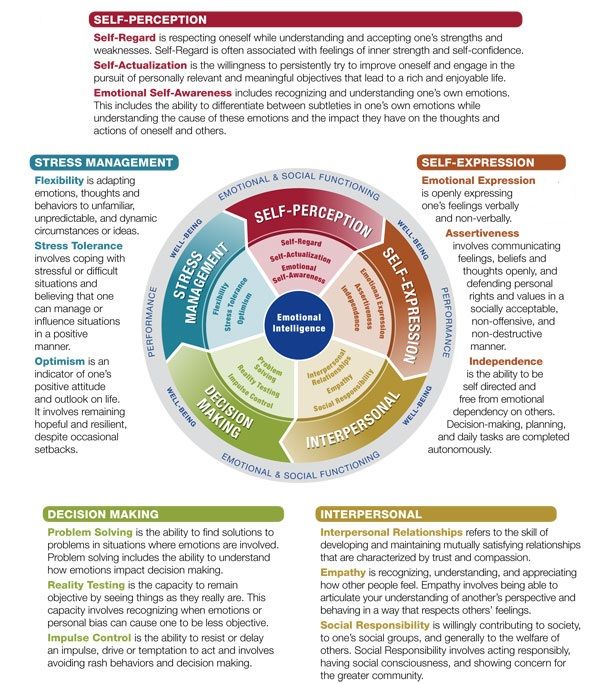 People with high EQ are more likely to work on rhetorical devices or are already good at persuasion techniques. They know how to verbally prioritize, don't expect their emotions to be guessed, and rarely slip into passive-aggressive behavior.
People with high EQ are more likely to work on rhetorical devices or are already good at persuasion techniques. They know how to verbally prioritize, don't expect their emotions to be guessed, and rarely slip into passive-aggressive behavior.
Emotional intelligence helps to bring people together and initiate changes in a family or group without causing negative feelings in anyone, to see the advantages of everyone individually when achieving common goals is required, to share experiences and educate each other. Teams with such people are almost always a breeding ground where it is easy to grow and acquire many related skills, and at the same time consolidate self-confidence. And, of course, emotional intelligence is necessary if it is necessary to approach the conflict consciously, to resolve it without mutual accusation and unfavorable compromise. Instead of anxiety and fear, give up positions. A person with a high EQ will choose a sincere conversation between the conflicting parties, will not avoid the role of an intermediary, but will help to express mutual claims and develop a strategy for further actions.
How to Improve Emotional Intelligence: 5 Actionable Steps
Unlike many innate talents, like math skills or an ear for music, emotional intelligence as a social skill can be improved throughout life. As a work team, as a couple, in relationships with parents, friends and children, we can constantly work on empathy and communication skills, which will definitely affect the quality of our relationships, mood and lifestyle.
© Vijay Patel; erhui1979 / istockphoto.com
- Step One -
Putting Yourself in Another Person's Place
It's a good start to study the person we want to put ourselves in. A crying little baby is most often tired or hungry. An annoyed neighbor could not get enough sleep because of the construction under the window. A disgruntled colleague is going through a difficult breakup. Too much new work has fallen on my mother. The wife is tired, torn between home and work. The boss is hungover, scowling, and making harsh comments.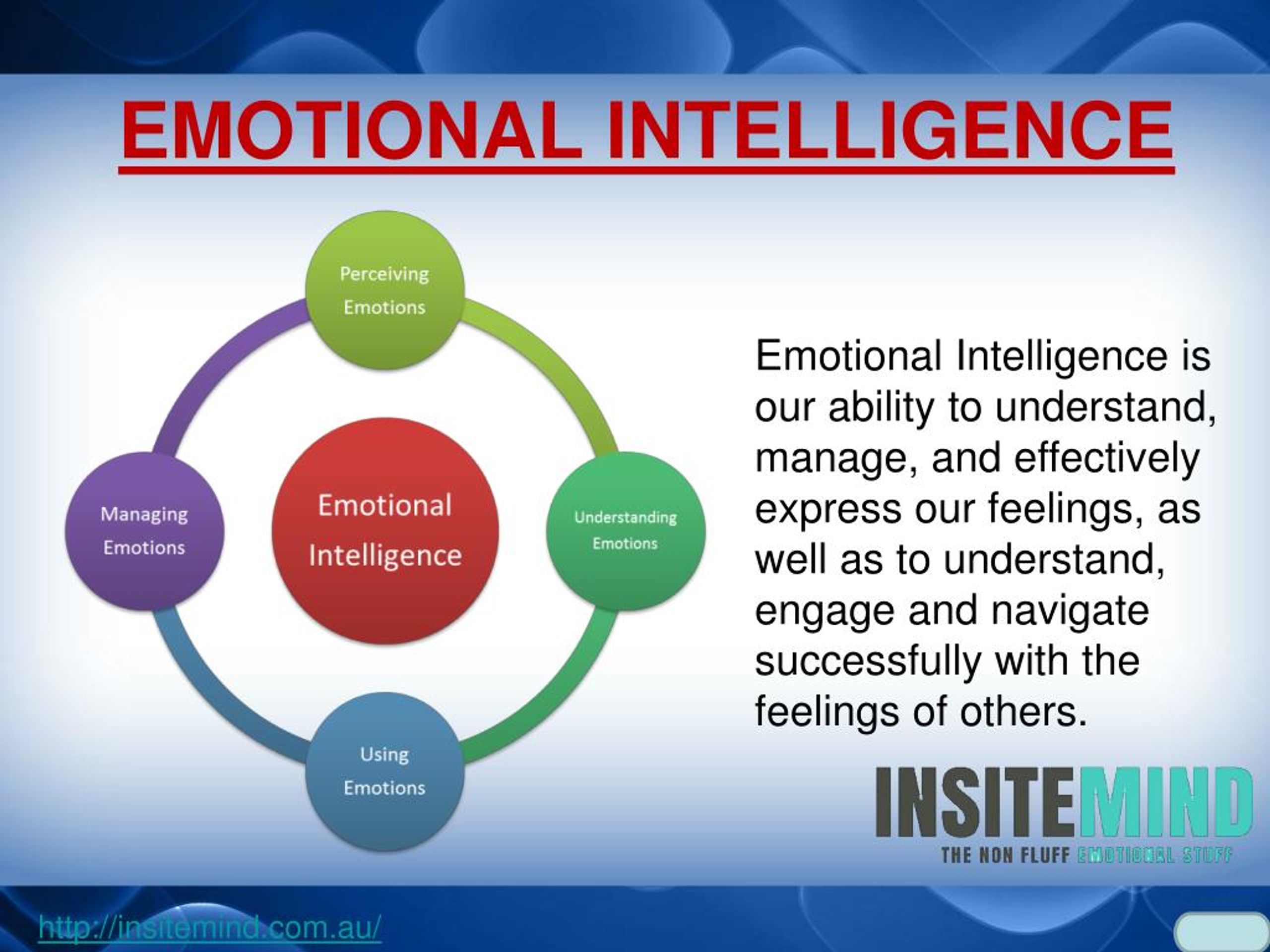 My best friend has been depressed for over a year. A tipsy stranger on the street wants to chat. A subordinate in a panic failed the third project in a row. By analyzing with whom and in what state we are talking, we better understand how they feel right now and why they act the way they do. It is absolutely not necessary to leave people the opportunity to make mistakes without consequences - in some situations it is simply necessary to outline the boundaries of what is acceptable. But knowing what is happening in the lives of those with whom we encounter every day is absolutely necessary so that our mutual expectations and demands are fair. Put yourself in the place of a woman who has to drive half a city with a pram, or a man who hasn't been on vacation for more than two years, or a child who is never turned away. And it will be much easier for you to understand how they feel at the moment.
My best friend has been depressed for over a year. A tipsy stranger on the street wants to chat. A subordinate in a panic failed the third project in a row. By analyzing with whom and in what state we are talking, we better understand how they feel right now and why they act the way they do. It is absolutely not necessary to leave people the opportunity to make mistakes without consequences - in some situations it is simply necessary to outline the boundaries of what is acceptable. But knowing what is happening in the lives of those with whom we encounter every day is absolutely necessary so that our mutual expectations and demands are fair. Put yourself in the place of a woman who has to drive half a city with a pram, or a man who hasn't been on vacation for more than two years, or a child who is never turned away. And it will be much easier for you to understand how they feel at the moment.
- Step two -
Naming emotions: own and others
Most people do not know how to name their emotions and consider this an extra skill.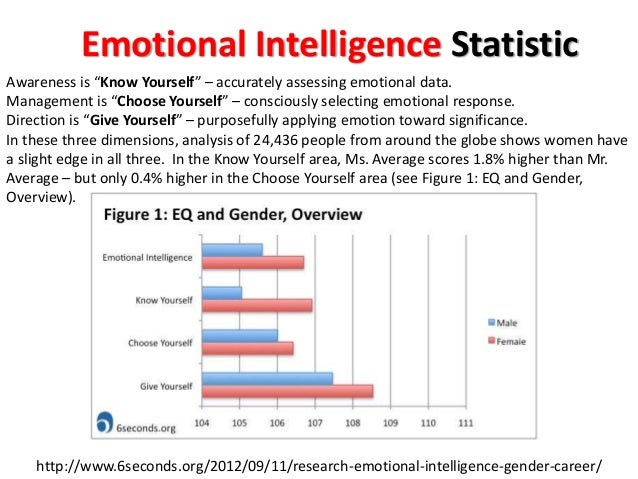 Meanwhile, anger is very different from resentment and disappointment, and it is necessary to analyze your own and other people's emotions in order to know your own weaknesses. One of the best ways is to replenish the emotional vocabulary with new descriptions of emotions: to separate anxiety from irritation, fatigue from apathy. This is best done in combination with mood diary : Keep a daily diary of changing mood and record emotions during and after events - meetings, conversations, cultural events and new acquaintances. So you, firstly, will see what events of the day and how they affect you (positively or negatively), and secondly, you will understand the tangle of conflicting feelings that different situations and people cause in you. When you understand what negative emotions dominate in life, it will be easier to find a way out for them: it is no coincidence that active sports and jogging are advised from anger, and sweets are not advised to seize anxiety. When you learn to name and define your emotions, it will be much easier to identify others - by verbal and non-verbal signals.
Meanwhile, anger is very different from resentment and disappointment, and it is necessary to analyze your own and other people's emotions in order to know your own weaknesses. One of the best ways is to replenish the emotional vocabulary with new descriptions of emotions: to separate anxiety from irritation, fatigue from apathy. This is best done in combination with mood diary : Keep a daily diary of changing mood and record emotions during and after events - meetings, conversations, cultural events and new acquaintances. So you, firstly, will see what events of the day and how they affect you (positively or negatively), and secondly, you will understand the tangle of conflicting feelings that different situations and people cause in you. When you understand what negative emotions dominate in life, it will be easier to find a way out for them: it is no coincidence that active sports and jogging are advised from anger, and sweets are not advised to seize anxiety. When you learn to name and define your emotions, it will be much easier to identify others - by verbal and non-verbal signals.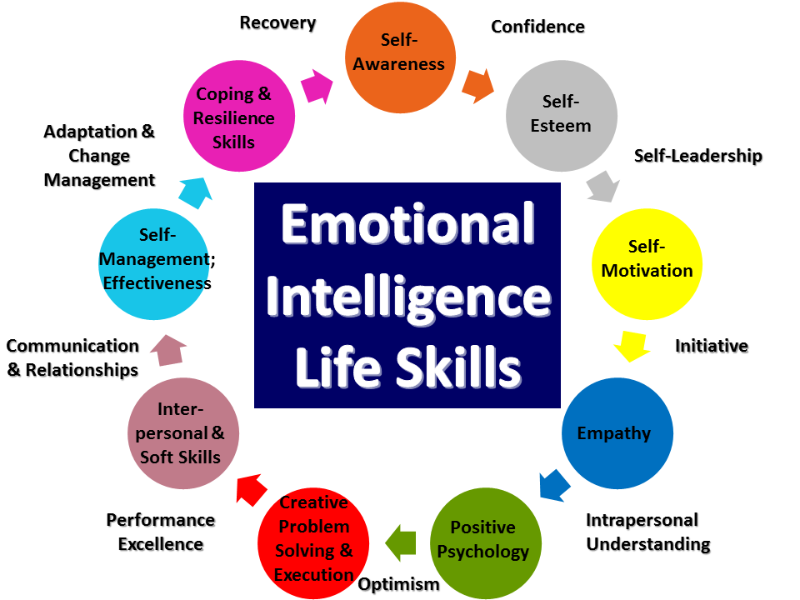 And forever separate emotions that are related to you from random ones: you don’t need to comprehend the behavior of an annoyed person in public transport, but the partner’s constant claims should be taken into account.
And forever separate emotions that are related to you from random ones: you don’t need to comprehend the behavior of an annoyed person in public transport, but the partner’s constant claims should be taken into account.
- Step Three -
Expand your horizons
Often problems with emotional intelligence are due to the fact that we drowned in our information bubble. It has already been proven that knowledge of several foreign languages helps a person to better absorb information about the diversity of the world. It is necessary to broaden one's horizons - to read fiction books and memoirs, to watch feature films and documentaries, to be interested in science, to travel, to educate oneself - in order to understand how people differ in talents and aspirations and how problematic it is for life and career to measure everyone by one measure. Modests and careerists, swindlers and idealists will be found in world literature and cinema, and each of them will have their own exciting story. Understanding a complex and disordered world in which everyone can find what they need is an important step for resolving conflicts, building harmonious relationships and managerial growth. Books, films, exhibitions, trips and new skills are not just erudition, but also a way to better understand others.
Understanding a complex and disordered world in which everyone can find what they need is an important step for resolving conflicts, building harmonious relationships and managerial growth. Books, films, exhibitions, trips and new skills are not just erudition, but also a way to better understand others.
- Step Four -
Think Two Steps Ahead
Emotional intelligence is related to long-term planning: setting priorities and goals, strategic allocation of resources, and tactics for immediate action. In building relationships with others, it is always worth dividing people into those with whom we spend most of our time and those who have no influence on our lives. All the powers of emotional intelligence should be used to ensure that communication with the inner circle is filled and interesting. Spend your time on those from whom you learn a lot, who surpass you in personal and professional qualities, surround yourself with caring and harmonious people, and communication with them will bear fruit.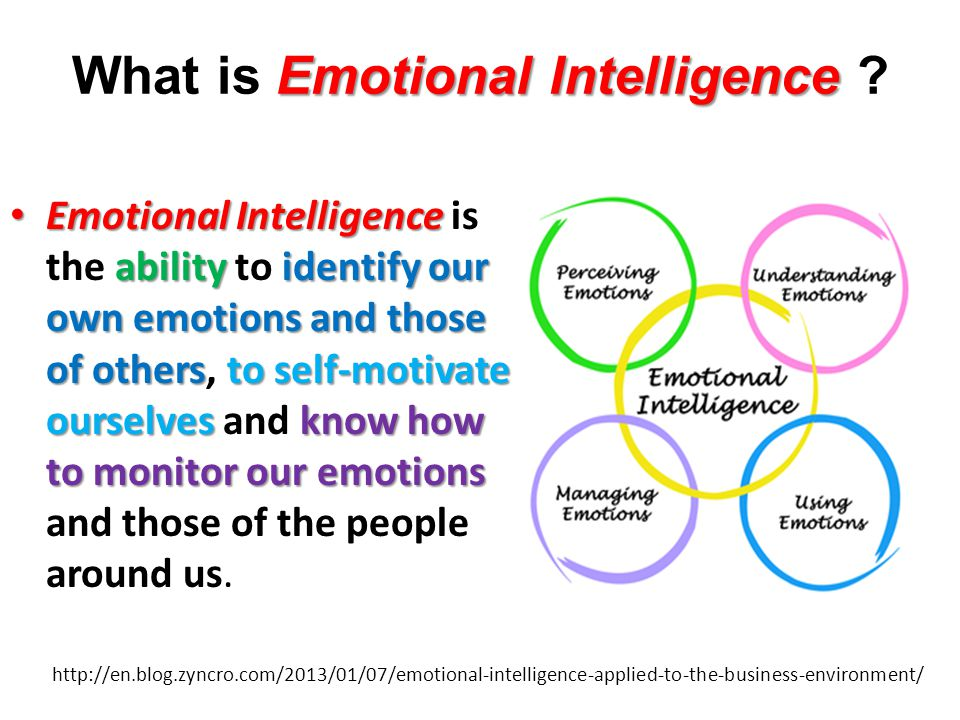 Think about how to get into such a team or assemble one if you are responsible for it. Think about what kind of life is important and comfortable for you and what actions will lead you to it. Tailor your budget to your goals and learn how to save. Save money for a smart purchase. Help others by discussing it and coming to an agreement. Look at conflict and obstacles as an intermediate stage, overcoming which new opportunities will open up for you. Carefully spell out all work and personal commitments in advance and don't make false promises or set unreasonable expectations. Emotional intelligence helps to measure mental strength and capture the mood of someone who can and wants to help you move forward in your plans. If the environment and intended goals do not match your current state, it is never too late to replay and get what you are striving for.
Think about how to get into such a team or assemble one if you are responsible for it. Think about what kind of life is important and comfortable for you and what actions will lead you to it. Tailor your budget to your goals and learn how to save. Save money for a smart purchase. Help others by discussing it and coming to an agreement. Look at conflict and obstacles as an intermediate stage, overcoming which new opportunities will open up for you. Carefully spell out all work and personal commitments in advance and don't make false promises or set unreasonable expectations. Emotional intelligence helps to measure mental strength and capture the mood of someone who can and wants to help you move forward in your plans. If the environment and intended goals do not match your current state, it is never too late to replay and get what you are striving for.
- Step Five -
Get training or psychotherapy
Very often it is difficult to find resources and knowledge for deep changes in order to make a sharp qualitative leap in understanding oneself and others.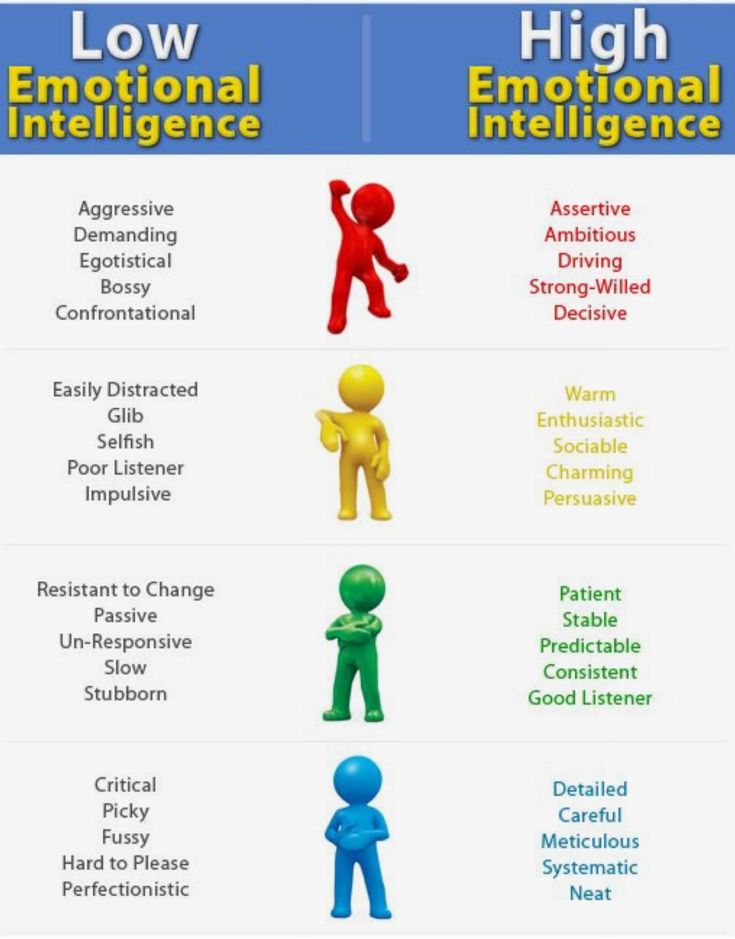 In this case, psychological training or psychotherapy can be a very useful tool on the path to self-knowledge. Training is recommended for psychologically healthy people, without problems with appetite and sleep, in a stable positive state to achieve career and personal goals with a personal motivation coach. Trainings are shown to those who are tired of a work routine or an unfavorable personal situation and who have enough internal strength to do significant work on themselves.
In this case, psychological training or psychotherapy can be a very useful tool on the path to self-knowledge. Training is recommended for psychologically healthy people, without problems with appetite and sleep, in a stable positive state to achieve career and personal goals with a personal motivation coach. Trainings are shown to those who are tired of a work routine or an unfavorable personal situation and who have enough internal strength to do significant work on themselves.
Psychotherapy is a deeper and longer-term undertaking that requires a reassessment of oneself, one's achievements, one's environment and one's lifestyle. Often it is accompanied by the acquisition of new habits, parting with toxic environments, changing jobs and even places of residence, and no good therapist can tell you where the therapy will take you. Both training and therapy are aimed at expanding emotional intelligence, developing the ability to identify and control emotions, work with fears and negative attitudes, and overcome negative patterns through a fundamentally new set of actions.